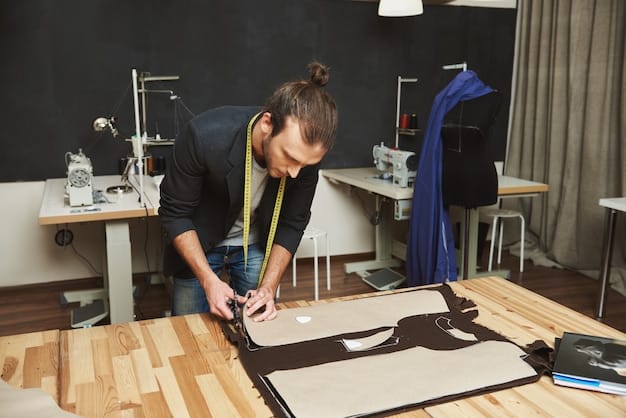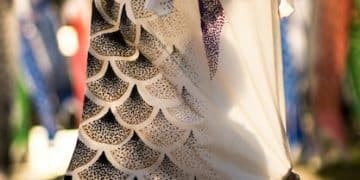US Fashion Education Initiatives: Shaping Future Designers

Advertisements
US Fashion Education Initiatives are crucial in shaping the future of design by equipping aspiring designers with the necessary skills, knowledge, and industry connections to thrive in a competitive global market.
The landscape of fashion design is constantly evolving, and **US Fashion Education Initiatives** play a vital role in preparing the next generation of designers. From technical skills to creative vision, these programs are instrumental in shaping the future of the industry.
Advertisements
The Importance of Formal Fashion Education
Formal fashion education offers a structured environment where students can learn the fundamentals of design, pattern making, and garment construction. This foundational knowledge is crucial for building a successful career in the fashion industry.
Comprehensive Skill Development
Fashion schools provide comprehensive skill development, covering everything from sketching and draping to digital design and marketing. This holistic approach ensures that graduates are well-rounded professionals ready to tackle various roles in the industry.
Advertisements
Industry Connections and Networking
One of the significant advantages of formal education is the opportunity to build industry connections. Many programs offer internships, guest lectures, and networking events that allow students to interact with established designers and industry professionals.

- Enhanced technical skills
- Development of a unique design aesthetic
- Understanding of fashion history and trends
- Creation of a professional portfolio
Graduates from reputable fashion schools often have a competitive edge in the job market due to their comprehensive training and professional network. These skills and experiences are invaluable for launching a successful career.
Top US Fashion Schools and Their Initiatives
The United States is home to some of the world’s top fashion schools, each with unique initiatives aimed at nurturing and developing future designers. These schools are at the forefront of fashion education, constantly adapting their curricula to meet the evolving needs of the industry.
Parsons School of Design
Parsons School of Design, located in New York City, is renowned for its rigorous academic programs and focus on innovation. The school’s initiatives include collaborations with leading fashion brands and a strong emphasis on sustainable design practices.
Fashion Institute of Technology (FIT)
FIT, also in New York City, offers a wide range of programs from design to business, preparing students for diverse roles in the fashion industry. FIT’s initiatives include international study programs and partnerships with local manufacturers.

- Scholarship programs for talented students
- Industry-sponsored design competitions
- Mentorship programs with experienced professionals
- State-of-the-art facilities and resources
These initiatives provide students with invaluable opportunities to gain real-world experience and showcase their talents, setting them up for success in the competitive fashion industry.
The Role of Technology in Fashion Education
Technology is transforming the fashion industry, and fashion education is adapting to incorporate new tools and techniques. From 3D printing to virtual reality, technology is empowering designers to create and innovate in unprecedented ways.
Digital Design and Pattern Making
Digital design software has become an essential tool for fashion designers. Programs like Adobe Illustrator and Clo3D allow designers to create detailed sketches, develop patterns, and visualize garments in a virtual environment.
Sustainable and Ethical Practices
Technology is also playing a crucial role in promoting sustainable and ethical practices in the fashion industry. Innovations like digital printing and on-demand manufacturing reduce waste and minimize the environmental impact of production.
- Virtual reality (VR) for immersive design experiences
- 3D printing for creating prototypes and customized garments
- Artificial intelligence (AI) for trend forecasting and design optimization
- E-commerce platforms for direct-to-consumer sales and marketing
By integrating these technologies into the curriculum, fashion schools are preparing students to be innovative problem-solvers and leaders in the future of fashion.
Internship Programs and Industry Partnerships
Internship programs and industry partnerships are vital components of fashion education, providing students with hands-on experience and valuable connections. These opportunities allow students to apply their knowledge in real-world settings and learn from industry professionals.
Gaining Real-World Experience
Internships offer students a chance to work alongside experienced designers, merchandisers, and marketers, gaining insights into the day-to-day operations of a fashion company. This experience is invaluable for understanding the industry and developing professional skills.
Networking Opportunities
Industry partnerships create networking opportunities for students, allowing them to build relationships with potential employers and mentors. These connections can lead to future job opportunities and career advancement.
- Collaborative projects with fashion brands
- Guest lectures and workshops by industry leaders
- Career fairs and recruitment events
- Mentorship programs with experienced professionals
These experiences not only enhance students’ skill sets but also provide them with a deeper understanding of the industry and its challenges, preparing them for successful careers.
The Impact of Fashion Education on Sustainable Design
Sustainability has become a critical issue in the fashion industry, and fashion education is playing a key role in promoting sustainable design practices. Schools are incorporating sustainability into their curricula and encouraging students to develop innovative solutions to environmental challenges.
Sustainable Materials and Production Methods
Fashion schools are educating students about sustainable materials, such as organic cotton, recycled polyester, and innovative plant-based fabrics. They are also teaching sustainable production methods, such as waterless dyeing and zero-waste design techniques.
Ethical Labor Practices
In addition to environmental sustainability, fashion education is also emphasizing ethical labor practices. Students are learning about fair wages, safe working conditions, and the importance of transparency in the supply chain.
- Design for durability and longevity
- Upcycling and repurposing existing materials
- Minimizing waste and reducing environmental impact
- Promoting ethical sourcing and production practices
By integrating sustainability into their design process, students are contributing to a more ethical and environmentally responsible fashion industry.
The Future of Fashion Education
The future of fashion education is likely to be characterized by even greater integration of technology, a stronger emphasis on sustainability, and a more global perspective. Fashion schools will need to continue adapting their curricula to meet the evolving needs of the industry.
Personalized Learning Experiences
Technology will enable fashion schools to offer more personalized learning experiences tailored to individual students’ strengths and interests. AI-powered platforms can provide customized feedback and learning paths, helping students reach their full potential.
Global Collaboration and Exchange Programs
Fashion education will become increasingly global, with more opportunities for students to collaborate with peers from around the world. Exchange programs and international design competitions will foster cross-cultural understanding and creativity.
- Micro-credentials and online learning platforms
- Interdisciplinary collaborations with other fields
- Focus on entrepreneurship and innovation
- Integration of data analytics and consumer insights
By embracing these trends, fashion education will continue to play a pivotal role in shaping the future of the fashion industry, preparing graduates to be innovative, ethical, and globally-minded leaders.
| Key Point | Brief Description |
|---|---|
| 🎓 Formal Education | Provides structured learning and foundational skills. |
| 🤝 Industry Connections | Offers networking and internship opportunities. |
| 🌱 Sustainable Design | Emphasizes ethical and eco-friendly practices. |
| 💻 Technology Integration | Incorporates digital tools for design and production. |
Frequently Asked Questions
▼
Formal fashion education provides a structured learning environment, comprehensive skill development, and valuable industry connections that are essential for a successful career in the competitive fashion industry.
▼
Internship programs offer practical experience, networking opportunities, and insights into the day-to-day operations of fashion companies, helping students apply their knowledge and develop professional skills.
▼
US fashion education initiatives integrate sustainable materials, ethical labor practices, and eco-friendly production methods into the curriculum, encouraging students to develop innovative solutions for environmental challenges.
▼
Technology plays a crucial role by providing tools for digital design, pattern making, 3D printing, and virtual reality, enabling students to innovate and create in unprecedented ways while also promoting sustainable practices.
▼
Fashion education is adapting by integrating technology, emphasizing sustainability, fostering global collaboration, and offering personalized learning experiences to prepare students to be innovative, ethical, and globally-minded leaders.
Conclusion
In conclusion, US Fashion Education Initiatives are instrumental in shaping the future of fashion by providing aspiring designers with the skills, knowledge, and connections they need to succeed. By embracing technology, promoting sustainability, and fostering collaboration, these initiatives are preparing the next generation of leaders to drive innovation and positive change in the industry.





